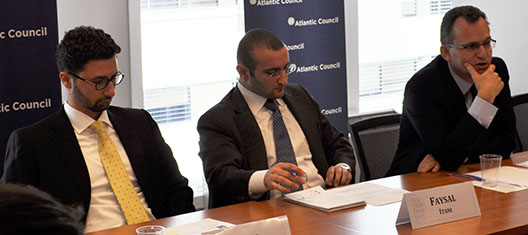 After weeks of debate that nearly collapsed the government, Lebanon’s cabinet approved a policy statement on March 14, 2014. The debate focused on Lebanon’s position on the conflict in Syria and the role and future of Hezbollah’s armed militia, over which the March 8 and March 14 alliances disagree. The conclusion of the debate and Parliament’s vote of confidence in the government on March 21, 2014 ended nearly a year of institutional deadlock.
After weeks of debate that nearly collapsed the government, Lebanon’s cabinet approved a policy statement on March 14, 2014. The debate focused on Lebanon’s position on the conflict in Syria and the role and future of Hezbollah’s armed militia, over which the March 8 and March 14 alliances disagree. The conclusion of the debate and Parliament’s vote of confidence in the government on March 21, 2014 ended nearly a year of institutional deadlock.
On Friday, March 14, 2014, the Rafik Hariri Center for the Middle East hosted a discussion, “Lebanon’s Neutrality toward the Syrian Conflict: Hot Air or Realistic Promise?” The event featured commentary from Scowcroft Center senior fellow Bilal Saab and Middle East Institute vice president for policy and research Paul Salem. The discussion was moderated by resident fellow Faysal Itani.
Salem opened the discussion by providing a historical perspective of neutrality in Lebanese foreign policy, noting that neutrality is not a new phenomenon in Lebanon. Throughout its history, Lebanon’s foreign policy has shifted between being fixed to another country’s foreign policy and neutrality. Saab then argued that Lebanon’s neutrality is “hot air” unless Hezbollah withdraws or reduces its military involvement in Syria. The only circumstance under which this could happen, Saab contended, is if Hezbollah’s relationship with Lebanon’s Shiite community begins deteriorate. As Sunni militants increasingly target Shiite communities in Lebanon, citing Hezbollah’s involvement in Syria on the regime’s side, it is possible that Hezbollah will withdraw or limit its involvement in the Syrian conflict out of self interest.
